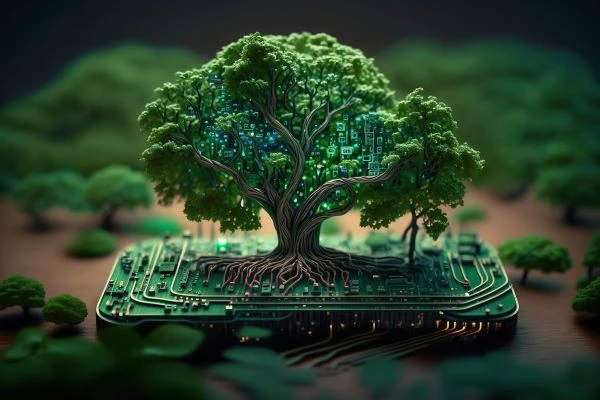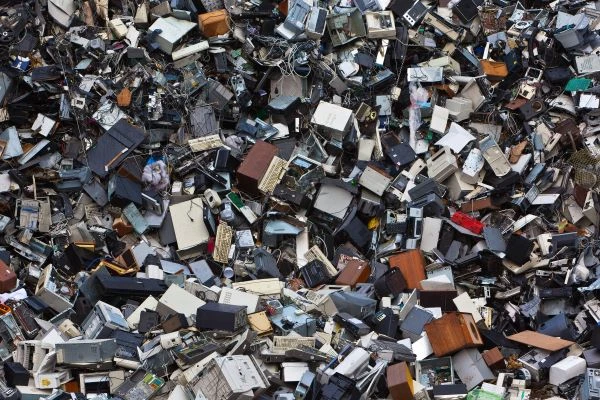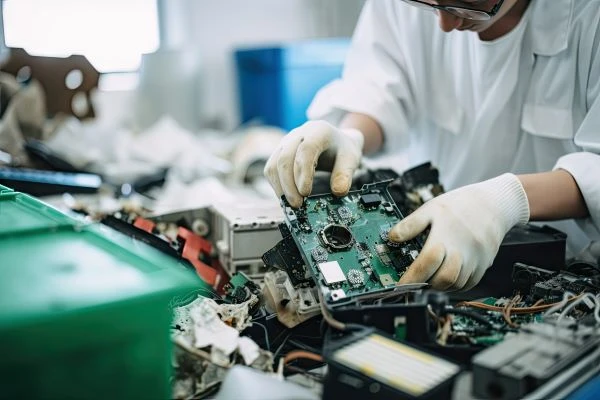
In our rapidly evolving digital age, the influx of electronic devices has brought convenience and innovation to our lives like never before. However, this technological progress comes with a hidden cost: electronic waste, or e-waste. E-waste encompasses discarded electronic devices, ranging from smartphones and laptops to household appliances, that have outlived their usefulness or become obsolete.
As this digital landscape continues to expand, so does the challenge of managing the ever-mounting piles of e-waste. In this exploration, we delve into the concept of e-waste, examining its implications for the environment, health, and society. Moreover, we unravel the transformative benefits that arise from recycling e-waste, shedding light on how responsible disposal practices can pave the way towards a more sustainable and resource-efficient future.
Growing Concerns
The accelerated pace at which cutting-edge technologies emerge and older devices become obsolete has paved the way for an unprecedented accumulation of discarded electronics. This mounting tide of electronic cast-offs presents a multifaceted challenge, with far-reaching implications for both the environment and human well-being. Improper disposal of these electronic relics, often marked by haphazard landfilling or rudimentary recycling practices, can cause a myriad of detrimental effects.
The threat of toxin leakage, a sinister consequence of neglectful e-waste management, hovers ominously. Hazardous substances ingrained within these discarded devices, such as lead, mercury, and other pollutants, possess the potential to infiltrate soil and water sources, tainting ecosystems and jeopardising public health. As our embrace of innovation propels us toward newer horizons, the pressing need to address the escalating tide of e-waste grows ever more urgent, compelling us to adopt responsible recycling practices and innovative solutions to safeguard our planet and its inhabitants.
Environmental Preservation
E-waste recycling serves as a practical defence against resource depletion, providing a path to safeguard our planet’s valuable materials. This process involves the careful disassembly and revitalisation of items, such as gold, silver, and copper, which are retrieved from electronic devices. Through precise extraction and purification, these elements are revitalised, reducing the demand for environmentally burdensome mining activities.
Recycling e-waste also goes beyond material recovery, contributing to a more efficient use of energy. It helps reduce the energy-intensive processes involved in mining, refining, and manufacturing new goods, thereby lessening the carbon footprint and environmental strain. This combination of conserving resources and improving energy efficiency brings about positive change, blending innovation and responsibility. E-waste recycling stands as a practical solution to the growing waste issue while also promoting the delicate balance between human advancement and nature preservation.
Hazard Mitigation
Recycling plays a pivotal role in preventing the release of harmful toxins into the environment. Through proper recycling processes, these harmful substances are carefully extracted and contained, minimising the likelihood of their dispersion. By diverting e-waste away from landfills and incinerators, recycling effectively breaks the cycle of potential pollution, contributing to cleaner soils, purer water sources, and healthier surroundings. This proactive approach to hazard mitigation showcases the practical benefits of responsible e-waste disposal, demonstrating how recycling serves as a safeguard against the potential ecological and health repercussions of toxic material release.

The process of recycling consumes notably less energy than the extraction and processing of raw materials making it far more sustainable. This energy efficiency curtails greenhouse gas emissions, a crucial stride in our collective effort to address climate change. By opting for recycling over raw material extraction, we partake in a pragmatic measure that extends its impact beyond waste reduction, playing a role in lessening the overarching environmental footprint.
Data Security
Amidst the landscape of e-waste recycling lies a crucial realm often overlooked – data security. Beyond the physical components, discarded electronic devices carry with them a digital imprint of our lives and activities. Proper recycling procedures not only address environmental concerns but also safeguard against the potential perils of data breaches. Personal and sensitive information stored within these devices, from financial records to personal correspondence, can be susceptible to unauthorised access if not managed correctly.
The act of recycling, when undertaken responsibly, becomes a fortress of protection for individuals and organisations alike. Certified recycling facilities employ rigorous protocols to ensure the complete erasure of data from devices before processing. This meticulous approach alleviates concerns about information falling into the wrong hands, offering peace of mind to those entrusting their devices for recycling.
In an era where data breaches can have far-reaching consequences, from identity theft to corporate espionage, the importance of secure e-waste disposal cannot be understated. Proper recycling, in its dual role as an environmental safeguard and a data fortress, underscores the significance of responsible disposal practices.
Job Creation
The e-waste recycling industry is a multifaceted sector that fosters employment across various stages of the recycling journey. From the initial collection of discarded electronics to the meticulous sorting and careful dismantling of components, a diverse array of roles is established. Skilled technicians, refurbishment experts, and processing professionals converge, collectively driving the machinery of e-waste recycling forward.
This sector’s labour-intensive nature reverberates positively within local economies. Communities hosting e-waste recycling facilities witness a boost in employment opportunities, thereby bolstering their socio-economic fabric. Moreover, these roles often encompass a range of skill levels, welcoming both technical experts and entry-level workers, fostering a diverse job market.

In addition to nurturing local economies, the job creation spurred by e-waste recycling contributes to a broader societal narrative. It embodies a commitment to sustainable practices and responsible consumption, cultivating a sense of shared responsibility among individuals and industries alike. Ultimately, beyond the mechanical processes, e-waste recycling intertwines with the human experience, offering not only environmental benefits but also a platform for livelihoods to flourish and communities to thrive.
In the realm of electronics, where the frenetic pace of advancement often overshadows its environmental repercussions, e-waste recycling emerges as a beacon of change. The intricate interplay between responsible disposal and resource revival reveals a path towards a more sustainable future. As we’ve explored the manifold benefits of recycling e-waste – from environmental preservation and hazard mitigation to job creation and data security – a pivotal theme emerges: the synergy between e-waste recycling and the concept of a circular economy.
E-waste recycling, in its essence, exemplifies the core tenets of a circular economy – a model that champions the regeneration of materials, the extension of product lifecycles, and the minimisation of waste. By diverting discarded electronics from landfills, we align ourselves with the ethos of circularity, breathing new life into components that might otherwise languish in obscurity. The endeavour, while grounded in pragmatism, radiates a profound impact – one that reverberates from local economies to global environmental stewardship.
In the tapestry of progress, where our technological pursuits weave the fabric of modernity, e-waste recycling stands as a thread of conscious choice. It’s a choice that fuels a circular economy, harmonising innovation with sustainability. As we navigate the ever-evolving landscape of electronics, we’re called upon to recognise the transformative power of recycling and its pivotal role in rewiring our collective approach to consumption, preservation, and progress.
